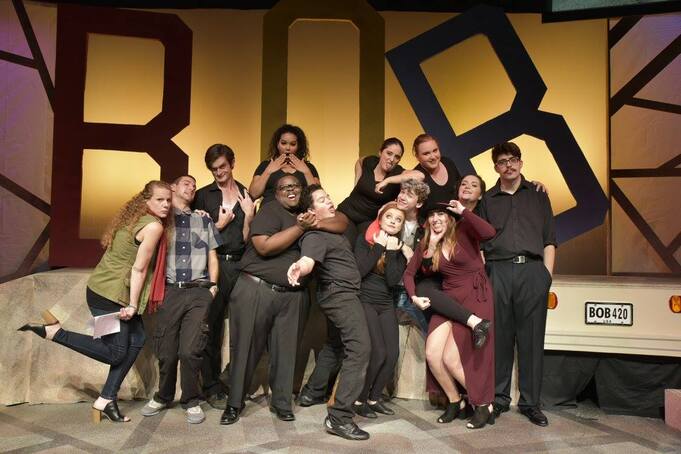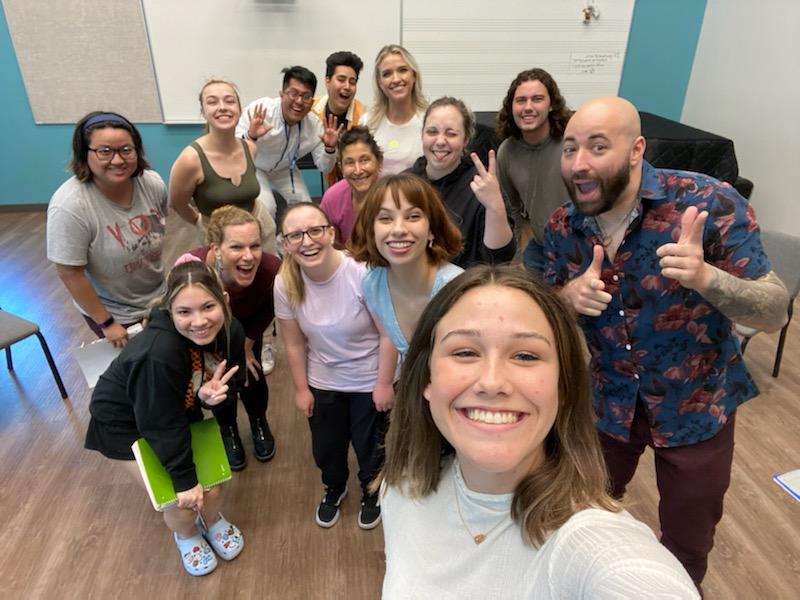Teaching Philosophy
“I regard the theatre as the greatest of all art forms, the most immediate way in which a human being can share with another the sense of what it is to be a human being.”- Oscar Wilde
One of the greatest places for a person to explore the true business of “being human” is in an Acting Class. Theatre is collaborative and therefore, cannot be done in a vacuum. It requires actors and artists willing to risk connection-raw, vulnerable connection-both terrifying and exhilarating! These are the aspects that drew me to become a theatre professional, but it is the constant evolution of teaching students and seeing their growth and discoveries, that excites me and has molded my Teaching Philosophy.
As a teacher, I find it essential to create a safe space for students. This is cultivated by ensemble building exercises, a sense of creative “play” and an environment where it is okay to fail, look silly and experiment. I use many foundational games from Viola Spolin and Augusto Boal. The other aspect needed to create this energy in the classroom is respect. I ask this of every student to extend to each other and themselves. This results in an environment of learning, creativity and expansion for all.
With each of my performance classes, I provide a structure that allows for both cognitive and visceral learning.
This includes:
Check-In: Helping the student to become present in the class and creating trust in the group.
Warm-up: These exercises can be physical, mental or emotional. They help the student to become ready for more challenging work.
Exercise: This is the skill-building section and will provide students with a variety of tools for the modalities they are working with - Acting, Voice or Movement.
Material: This is the practical application of the techniques and can range from Cold Readings, Script Work, Choreography, Poetry and Performance.
Reinforcement: This is provided as a way for a student to evaluate their experience in the class and find ways to apply the work to their artistry and their life.
In addition, I believe in a clear format and structure. This includes detailed Syllabi, Class Outlines and Calendars with specific goals that are followed and met. For more academic Theatre Classes such as Theatre History, Script Analysis or Theatre Appreciation, I provide dynamic discussions with interactive audio / visual examples, group learning and activities and constructive feedback on assessments and writings; always finding ways to make the material relevant and connect to the student where they are.
Finally, I believe in the arts and all they can provide to society. I am constantly thinking of ways to make a bridge from the work in the classroom to “real life” scenarios. As a teacher, it is my job to discover what the student needs and help them achieve those goals. For the student that wants to pursue the arts as a profession, I am sharing with them the professional techniques and disciplines needed to be successful. But I believe all students should be exposed to theatre and the arts. The tools they will acquire will help them to be strong, powerful and have a voice in the world while also learning how to be collaborative and responsive. Most importantly, I want them to know empathy, to understand those different than themselves and to discover their own creative “spark” and brilliance.
“Acting is a spiritual quest to touch human beings.” - Larry Moss
“I regard the theatre as the greatest of all art forms, the most immediate way in which a human being can share with another the sense of what it is to be a human being.”- Oscar Wilde
One of the greatest places for a person to explore the true business of “being human” is in an Acting Class. Theatre is collaborative and therefore, cannot be done in a vacuum. It requires actors and artists willing to risk connection-raw, vulnerable connection-both terrifying and exhilarating! These are the aspects that drew me to become a theatre professional, but it is the constant evolution of teaching students and seeing their growth and discoveries, that excites me and has molded my Teaching Philosophy.
As a teacher, I find it essential to create a safe space for students. This is cultivated by ensemble building exercises, a sense of creative “play” and an environment where it is okay to fail, look silly and experiment. I use many foundational games from Viola Spolin and Augusto Boal. The other aspect needed to create this energy in the classroom is respect. I ask this of every student to extend to each other and themselves. This results in an environment of learning, creativity and expansion for all.
With each of my performance classes, I provide a structure that allows for both cognitive and visceral learning.
This includes:
Check-In: Helping the student to become present in the class and creating trust in the group.
Warm-up: These exercises can be physical, mental or emotional. They help the student to become ready for more challenging work.
Exercise: This is the skill-building section and will provide students with a variety of tools for the modalities they are working with - Acting, Voice or Movement.
Material: This is the practical application of the techniques and can range from Cold Readings, Script Work, Choreography, Poetry and Performance.
Reinforcement: This is provided as a way for a student to evaluate their experience in the class and find ways to apply the work to their artistry and their life.
In addition, I believe in a clear format and structure. This includes detailed Syllabi, Class Outlines and Calendars with specific goals that are followed and met. For more academic Theatre Classes such as Theatre History, Script Analysis or Theatre Appreciation, I provide dynamic discussions with interactive audio / visual examples, group learning and activities and constructive feedback on assessments and writings; always finding ways to make the material relevant and connect to the student where they are.
Finally, I believe in the arts and all they can provide to society. I am constantly thinking of ways to make a bridge from the work in the classroom to “real life” scenarios. As a teacher, it is my job to discover what the student needs and help them achieve those goals. For the student that wants to pursue the arts as a profession, I am sharing with them the professional techniques and disciplines needed to be successful. But I believe all students should be exposed to theatre and the arts. The tools they will acquire will help them to be strong, powerful and have a voice in the world while also learning how to be collaborative and responsive. Most importantly, I want them to know empathy, to understand those different than themselves and to discover their own creative “spark” and brilliance.
“Acting is a spiritual quest to touch human beings.” - Larry Moss


